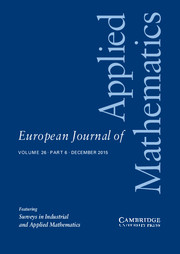Crossref Citations
This article has been cited by the following publications. This list is generated based on data provided by Crossref.
BARRAL, P.
NAYA-RIVEIRO, M. C.
and
QUINTELA, P.
2016.
Regularity of a thermoelastic problem with variable parameters.
European Journal of Applied Mathematics,
Vol. 27,
Issue. 2,
p.
213.


